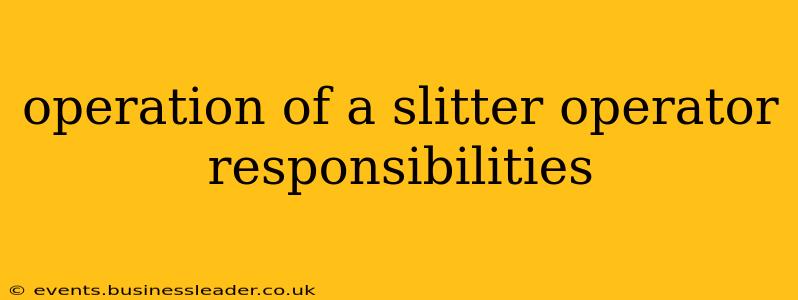The role of a slitter rewinder operator is crucial in converting large rolls of materials like paper, film, foil, and fabric into smaller, more manageable rolls. It's a skilled position demanding precision, attention to detail, and a strong understanding of machinery operation and safety protocols. This comprehensive guide outlines the key responsibilities of a slitter rewinder operator and explores best practices for optimal performance.
What are the Main Responsibilities of a Slitter Rewinder Operator?
The primary responsibility of a slitter rewinder operator is to efficiently and safely operate the slitter rewinder machine to produce high-quality slit rolls according to customer specifications. This involves a range of tasks, including:
-
Setting up the machine: This includes adjusting the slitting knives to the correct width, configuring the rewinding system, and selecting the appropriate tension and speed settings based on the material being processed. This requires a good understanding of the machine's controls and the properties of the materials being handled.
-
Loading and unloading materials: Operators are responsible for carefully loading the large parent roll onto the unwinding stand and then unloading the finished slit rolls. This process often involves using material handling equipment like forklifts or pallet jacks. Safety is paramount in this stage.
-
Monitoring the slitting process: Continuous monitoring is crucial to ensure the machine is operating correctly, the material is being slit to the correct specifications, and there are no defects or jams. Operators must be vigilant in identifying and addressing any issues that arise.
-
Quality control: Operators play a key role in ensuring the quality of the finished product. This involves inspecting the slit rolls for defects like wrinkles, tears, or inconsistencies in width. They must adhere to strict quality standards and report any deviations.
-
Maintaining the machine: Basic maintenance tasks, such as cleaning and lubricating the machine, are often part of the operator's responsibilities. They should be able to identify minor problems and perform simple repairs or report more complex issues to maintenance personnel.
-
Following safety procedures: Safety is of utmost importance. Operators must follow all safety regulations, wear appropriate personal protective equipment (PPE), and report any unsafe conditions immediately.
What are the Typical Skills Needed for this Position?
Beyond the operational tasks, successful slitter rewinder operators possess several key skills:
-
Mechanical aptitude: Understanding how machinery works is essential for troubleshooting problems and maintaining the equipment.
-
Attention to detail: Precision is paramount; even small errors can lead to significant issues.
-
Problem-solving skills: The ability to quickly diagnose and resolve problems that arise during operation is crucial.
-
Physical stamina: The job can be physically demanding, requiring the ability to lift and handle heavy rolls of material.
-
Ability to follow instructions: Adherence to written and verbal instructions is critical to ensure consistency and quality.
What are Some Common Challenges Faced by Slitter Rewinder Operators?
Operators frequently encounter challenges such as:
-
Material variations: Different materials require different settings and techniques.
-
Machine malfunctions: Equipment breakdowns can cause delays and disruptions.
-
Meeting tight deadlines: Production demands can be intense, requiring efficient operation.
-
Maintaining quality standards: Producing consistently high-quality slit rolls can be challenging.
How Do I Become a Slitter Rewinder Operator?
While formal qualifications aren't always strictly required, many employers prefer candidates with some experience in a manufacturing environment or with operating machinery. On-the-job training is common, with experienced operators mentoring new hires. Some companies may offer formal training programs.
What are the Career Progression Opportunities?
With experience and proven skills, slitter rewinder operators can progress to more senior roles, such as lead operator, supervisor, or even into maintenance or quality control positions.
By understanding the responsibilities, skills, and challenges associated with the role, aspiring slitter rewinder operators can effectively prepare for a successful career in this essential manufacturing position. The commitment to safety and attention to detail are key to excelling in this field.
